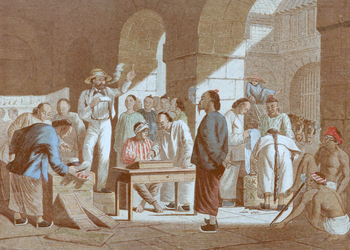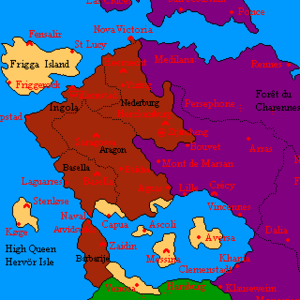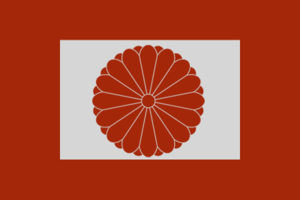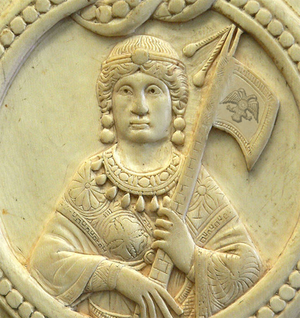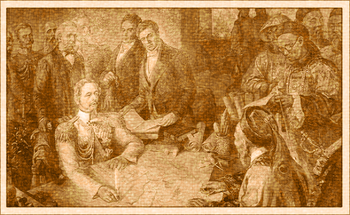Great Jing Dynasty
| The Jingdaoese Empire Empire of the Pure Path | |||
| |||
| Motto: Sensible and Ruthless | |||
| Anthem: Alte Kameraden | |||
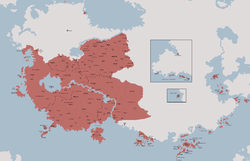
| |||
| Map versions | As part of Shireroth (Kildare): 1.5.0 - 15.4.6 | ||
| Capital | Daocheng | ||
| Largest city | Chuanliyang, Sizhecheng, Tianhoucheng, Xiacheng, Zhuaricheng | ||
| Official language(s) | Official language: Jingdaoese Other languages: | ||
| Official religion(s) | |||
| Demonym | Jingdaoese | ||
| - Adjective | Jingdaoese | ||
| Government | Absolute monarchy | ||
| - Heavenly Light | Sheng Emperor | ||
| - Imperial Chancellor | Xin Myksos | ||
| - Legislature | Jingbuist Council | ||
| Establishment | Grand Duchy of Southbatavia: 4510 ASC (December 11st 2011) | ||
| Area | NA | ||
| Population | ~45,000,000 | ||
| Active population | N/A | ||
| Currency | Stuivers | ||
| Calendar | |||
| Time zone(s) | |||
| Mains electricity | |||
| Driving side | |||
| Track gauge | |||
| National website | jingdao.nl | ||
| National forum | Forum | ||
| National animal | Raven | ||
| National food | Safir wings with cabbage | ||
| National drink | Imperial white tea | ||
| National tree | Holy Ginseng Tree | ||
| Abbreviation | DAO | ||
The Jingdaoese Empire, in ancient times referred to as Empire of Jingdao and Southbatavia, is an Anglo-Dutch micronation. Other names which are used are Empire of the Pure Path, Third Great Jingdaoese Empire and Great Jing Dynasty and Holy Grand Empire of Jingdao.
Through its long history, the Empire has seen much violence, destruction and mass immigrations, which often had religious and cultural causes. The region populated by the Jingdaoese has, since its establishment, been changed twice: the first time they migrated from Cibola to the former Antican Isles and later the centre of political power moved to the west (after Kildare was annexed into Jingdao). Instead of collapsing, these disasters proved to be omens for a rebirth and strengthening of the Nation its power. While to the outside world, the Empire's culture seems limited to an Asian-styled culture, but in reality it has a diverse mix of European (mainly German) and Asian cultures which have influenced the daily life of its citizens and the Heavenly Court and even Jingdaoese can still be surprised when visiting another province or State.
An important element of its society is the devotion towards the Emperor, of which some are called Heavenly Light if they have proven themselves to be reincarnations of one of the Goddess Sisera or Ancient Prophets. Depending on the era, the power and influence of the Emperor has differed, but never truly diminished. Even after the Destruction by the Obedience Machine in 5984 ASC, the Emperor received tremendous political power, despite the establishment of the Imperial Assembly.
The Jingdaoese People are renown for their propaganda and cultural development. Within its borders lived very diverse ethnic and cultural groups. This was the result of the Empire's conquest of the Apollonian Republic (Kildare), which held several ancient micronational civilisations within its borders (going back to the Apollo Sector). For a long time, the government policy was to assimilate these cultures instead of trying to erase them. This policy, taken by the Haigui Emperor in 5713 ASC, seemed logical through modern eyes, but it could have easily gone the other way (the Jingdaoese were also known to be merciless towards non-believers). Citizens were allowed to follow the culture and faith as they see fit, as long as certain aspects (mainly religious ones) were represented in one way or another and play a role. The position of the Emperor was the sole cultural aspect which plays an important role. Citizens are expected to, in one way or another, to recognise the presence and special position of their divine Emperor.
More recently (in the 6300's), during the reign of the Sheng Emperor, a more aggressive assimilation program was started. Those who were not considered sufficiently in line with Jingdaoese customs were not necessarily persecuted, but did lose certain citizens' privileges and assurances.
Terminology
Jingdao holds many different names, which it received through time. Some even say that the only thing the Jingdaoese and Elwynnese have in common is their love in giving their Realms numerous names with each their own significance.
The nation is frequently referred to as Jingdaoese Empire, or simply Jingdao. When it still was located on the Cibolan continent, the name Empire of Jingdao and Southbatavia was still frequently used. The citizens had left behind their colonial past, but still used the name in official documents. Several Decrees refer to the name of the early Emperors (like the Ci Emperor) seem to have the habit of including Southbatavia in the name. Over time this led to confusion, as both Jingdao and Southbatavia did no longer refer to separate regions, but overlapped.
Other names which are still used are: Empire of the Pure Path, which is mainly a religious title and is used in religious rites, the Third Great Jingdaoese Empire, which simply refers to the Third Heavenly Era in which the current nation exists, the Great Jing Dynasty; which refers to the Dynasty of Erasmii which is pure (Jin) and Holy Grand Empire of Jingdao, which was a name frequently in use throughout the reign of the Haigui Emperor and Dashi Emperor.
History
The history of Jingdao is a long one and goes back to the time it was just a colony and outpost of the Kingdom of Batavia. It survived its parent nation and grew into a nation which survived destruction after destruction, even making those destructions part of its culture and religious dogma's.
The history is closely intertwined with mythical, religious and fictional works, as of some periods not much is known, because of the loss of important documents.
Origin

The mythological foundation of the Jingdaoese people finds its origin in early times and is closely linked with Soloralist and Catologian myths and even Kildarian folklore. According to legends, the Jingdaoese became a distinct group in Airosamente (the current Apollo City). The tales tell about how the Great Plague had rampaged throughout the world and had almost made all Mikrons go extinct. With that, the Era of Man had begun, and the Gods and Mikrons slowly left Micras for mankind to rule.
It was in Airosamente that mankind constructed a tower, the Tower of Airosamente, which would look over the world. It had to be a symbol of unity of mankind, but soon became a grave insult towards the Gods who had so long taken care of humankind. Greed took over and the tower grew into a symbol which challenged the supremacy of the Divine Beings. In those days, a young girl was born from the ashes of the earth and brought to live by Cato and His wife Germania. To avoid direct interference with humankind, and to show them the right path to follow, that girl was blessed with extraordinary power, charisma and wisdom. The girl, who was blessed with the name Sisera, began to preach and soon gathered groups of people around Her.
These followers, who recognised in Her the words of the Gods. For years She preached in name of Germania and Cato, warning the people not to be overconfident. But the older She became, the more She was ignored. The number of followers decreased and many of them were forced to leave their family behind. This small group would later become the core of the Jingdaoese People. On a certain day, when Sisera had already reached the age of 88, She spoke to the workers at the Tower, once more warning them for what they did. The workers, fed up with Her warnings, began to throw stones to Her and gave Her a slow and gruesome death. She and Her followers would never forget what the Hun (impure) People had done to their Prophet and Daughter of Heaven.
When She entered the Mines of Germania, Her mother awaited Her and said She had deserved Her eternal peace more than anyone, even if mankind did not dare to listen to the Truth. Sisera knelt before Her mother and asked Her to give Her a new chance. She saw hope for the future and was convinced that She could rescue at least a few souls. Germania therefore listened to the pleas of Her Daughter and reincarnated Her.
The reincarnation came with a price: She would forever, till the end of times, have to return to Micras to save Her people from danger. Her reincarnations would be granted the power to remember what had happened in Her previous lives, but not till a certain age would be reached.
That being said, She returned to Airosamente, grew up among the love of Her followers, and once more led them on their crusade against impurity. Once more, the unbelievers mocked them, but in the end the punishment of the Gods made an end to the mockery. The Gods confounded their speech, so families and friends became divided and could no longer understand each other. Bloodbaths followed and, as usual, the Jingdaoese were blamed, as they had remained one solid group.
Humanity shattered and Sisera led Her people far away to a place where they would be safe, and could live in peace, harmony and spread the purity of their believes. Her people was thereafter led by Her descendants and, on occasion, Sisera would reincarnate. Not all descendants were blessed with the divine guidance of the Gods, but when they were, the people followed with a blind devotion. History will learn us that the Jingdaoese are - more than any other people - not attached to the land they were born on. Where there Heavenly Light is, they will follow.
Pre-Independence Era
The true history of Jingdao is - ironically - linked with the nation it would later govern: the Kingdom of Batavia. Throughout the reign of King Arkadius II des Vinandy several Batavian governments made attempts to increase the prestige of their nation (and appeal to the growing imperialist and nationalist groups within the country).
Industrial growth had led to an immense increase in population, surplus, which in turn led to new social tensions. Numbers of concerned people who also saw an increase in rules and laws (especially because of the liberal party, which pushed through an extensive expansion of the law system) and felt that there freedom was slowly limited, wanted to move to a less bureaucratic place.
It was then that groups of Batavian sailors and military men looked southwards, to the Cibolan continent. West of the Empire of Alexandria was untamed territory: peoples like the Aragonese, Saxons (Nederburgians) and Qingdaoese would be no match for the military might of Batavia. The earliest attempts to settle a decent colony, Aragon, found place in 2788 ASC.
The large amount of small settlements and colonies would eventually, under pressure of the early colonists, be united under a loose union called Batavian Cibola. From that moment, more and more colonists moved land inwards. This is also seen as the moment in which Batavian colonists and locals start to work together. Certain mixed communities start to grow, and the colonists made their first contact with the Saxons and Qindaoese who lived more eastwards (and who would later become known as the Jingdaoese).
The existence of the Batavian Cibolan colony was quickly challenged when in 3732 ASC a civil war broke out between the Nederburgian, Aragonese and Batavian forces. The war was ended, but at the cost of hundreds of lives and a growing distrust.
In 4161 ASC the Batavian Cibolan colonies were reformed and placed under a more centralised administration to combat political ineffectiveness and corruption. The colonies also underwent a name change, becoming Great Aragon, and saw the introduction of former Aragonese symbols. The attempts to spread democratic ideals in this region became very unpopular when massive electoral fraud was discovered in several local elections.
Through the ages, dissatisfaction with colonial rule would only grow slowly. It would take till chaos on the Homelands became clear and civil war broke out in the North, that the colonists and colonials took power in their own hands. The real birth year of the South Batavian nation is 4521 ASC, the year in which Herman Civilis became Grand Duke of the southern colonies and formed the Grand Duchy of South Batavia.
The ancestors of the Jingdaoese would watch most of the events which unfolded during these colonial years from a distance. The Qingdaoese, who had lived ages without the guidance of a descendant of Sisera, had retreated themselves behind the safe mountains and lived a prosperous life with the gold they found in their mines. It would be till the arrival of the Erasmus Dynasty in Nederburg (north of the Qingdaoese valley), that the group would start actively participating in politics again. With the rise of Herman Civilis and the presence of Erasmii, the Jingdaoese started backing the colonies with both manpower and financial means. The isolated Qingdaoese region would become the cradle of later imperial power. They once more took up the name Jingdaoese, as they felt that the moment was right.
While civil strife had unfolded in the north, South Batavia remained part of the Batavian nation and flourished while increasingly expanding its industrial power. It saw important (symbolic) events like hosting Expo 2012, an intermicronational world exhibition, in the Nederburgian city of Heemecht.
Times were changing, and time seemed to have ran out for the old Kingdom of Batavia. Herman Civilis left office, just before he died, in favour of Mordechai ben Erasmus. Mordechai would later become known as the first Emperor and would prepare the path towards independence. In 4779 ASC, his son, the later Kaiming Emperor would declare the southern colonies free from the Batavian oppression and establish an empire which would influence the politics of many Micrasian countries.
First Empire
Reign of the Kaiming Emperor (4779 - 4955 ASC)
In less than 250 ASC years, the Cibolan colonies had grown from a set of backward colonial settlements and villages into a dependency with a certain amount of prestige. Simon ben Erasmus, son of Mordechai, inherited a Grand-Duchy which was flourishing. But dark clouds were gathering in the north: conflicts and crises followed each other and it became clear that Batavia was looking to its colonies to carry most of its problems. In a daring move, Simon resisted against the government in 's Koningenwaarde and proclaimed the end of what he perceived as an unequal relationship between the Fatherland and its colonies.
The Empire of Southbatavia and Jingdao was established and from one day on another, the soldiers and public servants who had been ruled by their northern masters received the news that they would now serve an Emperor who was truly blessed by Heaven. The Kaiming Emperor became the first true Emperor and Heavenly Light, endorsed by the Catologian Church, but was confronted with much scepticism from several layers of the population. One of His first acts was to raise his father into status. Mordechai, who had served the Realm both as Prophet and ruler, was proclaimed posthumously the Mengjiang Emperor, which gave His own ascension to the Throne some feeling of continuousness.
With the energy of a young man, the Kaiming Emperor introduced a number of reforms, announced construction programs and replaced disloyal servants by more loyal ones. Peasant revolts were quickly beaten and massive food programs were started throughout the nation. Diplomatically He was successful in receiving recognition from both the old homeland as other realms. While documents contradict themselves, historians agree that the Tegong was also established with the duty to serve the Heavenly Light with utmost dedication. The trust and power entrusted to this organisation would soon lead to confrontations within the administration and would even threaten the reign of the Emperor it was meant to protect.
While loved by His people, the Emperor was also confronted with an alarming increase in birth rate, a result of the stability during the reign of His father and own early reign. It didn't take long before Jingdao was confronted with logistical and social problems because of the surplus population. Corruption was widespread and made the well-intended aid to battle poverty ineffective in some provinces. While the Emperors were often loved and even worshipped, the government saw several peasant uprisings during the 4770's ASC and onwards. During one of those uprisings, a young sergeant, Yuan Windsor, defended his post with a handful of soldiers against a mob of over 10,000 peasants. Yuan soon became a rising star within the military and within the year, in 4780 ASC, he was chosen by the Kaiming Emperor to 'clean up the house'. His appointment as Diwang led to an immense power shift from the Throne to a simple nobleman.
The Imperial administration was, and has always been, a battleground of several groups: the Armed Forces (the Army, because the Empire lacked a decent Navy in those days), the Catologian Church and civil authorities were in a constant struggle to gain power. In those days the Emperor had been ruling His Realm from behind the safe walls of Zijincheng, the capital city which was limited to access by only carefully-chosen personnel and high officials. Well-intended Decrees were published here and spread throughout the country, but because Yuan was the one who actually left the huge palace complexes, he succeeded in gaining more and more power over time. As a man of the military, he favoured the growth of the Armed Forces and sought to reduce the powers of the clergy. This brought him into conflict with the Magister of the Church, Miguel Windsor (who was a distant family member).
The Magister was successful in convincing the Emperor to leave His palace more frequently and to regain some of the lost influence. The plans of Yuan, to gain power through legals means, were temporarily foiled. The Emperor, neither blind nor deaf to the cries of His people, became convinced that the colonisation of the barbarian southern lands was the fastest and best solution.
Campaigns were held throughout the 4820's and 4830's and the province of Barbarije was successfully integrated into Jingdao after the defeat of several tribes. In 4835 ASC, 52 EGA according to the Southbatavian calender, a new campaign was launched and personally overseen by the enthusiast Emperor. With His army he moved further southwards against Shanglu, to integrate it into the nation. The campaign was successful, but the Emperor was betrayed and kidnapped. Many thought He was dead, and the Diwang took the chance to consolidate his power. Yuan Windsor proclaimed himself Regent in the absence of the Emperor and sought to make Grand Duchess Sisera into his puppet. This plan failed miserably and a group of soldiers - together with corrupt Tegong agents - was dispatched to Zijincheng to murder the heir to the Throne.
The battle which followed destroyed a part of the palace complex and many surprised Imperial Whites (the name of the ceremonial imperial guards) were killed in surprise before they could act. Sisera escaped thanks to the support of Tegong agents who had stayed loyal to the Throne. The escape of the Grand Duchess led to confusion throughout the Empire: a part of the population rallied behind the Diwang, others behind the heiress. She retreated into the mountains, from where she frequently raided caravans with gold for the Diwangs treasury.
It was not until 4852 ASC that the Kaiming Emperor - who had escaped his kidnappers and had lived on a cabbage farm in Shangly - came out of hiding, rallied a part of the army behind him and took power back. After a short and bloody year, both sides agreed to hold a truce: Basella became part of a Yuan-led state known as Yuandao, while the rest of the Empire stayed loyal to the Emperor. In 4877 ASC a more definite peace treaty would be signed in Rijnsburg (in Nederburg). Yuan entered the conference room, where on first sight many important nobles and the Emperor Himself were present. It turned out to be a trap, as a way of payback for Yuans own treason. The doors were closed and locked, so nobody could leave, after which hundred thousands of equine mantises were unleashed and killed and ate all guests in the room (including the actors, some nobles and a Babkhan dignitary) alive. The Empire was finally reunited. The harsh attitude towards traitors would become part of Jingdaoese culture and habits.
In the wake of the Yuan Rebellian, a number of Jingdaoese merchants and politicians, under the leadership of Jack Mounford, who was head of a Catologian military order, sailed to the island of Calbion. Calbion was admitted as a largely autonomous province shortly after. Although Jack Mounford as Prince of Calbion had always been loyal to the Jingdaoes government, relations between Calbion and the Imperial Government have at times been strained. Several incidents occured that made Sisera question the Calbain loyalty. These tensions reached a highpoint when Calbion declared independence. Refusing to accept, Sisera ordered her troops to attack the island. The Calbain Independence War resulted in the destruction of a large part of the Calbain nation.
Second Empire
The Empire of Jingdao-At-Sea
During the early days of the reinstituted Empire. The city of Tie Gang, then known as Tyrenia, became part of Jingdao. It expanded into an important mercantile hub for the Eastern Empire, which it remains till this day.
Third Empire

The Holy Grand Empire of Jingdao saw a period of great wealth, but also from despair. It was a period in which the Jingdaoese attempted to cooperate and slowly integrate the minorities within the country. This eventually led to social unrest. The weak democratic institutions, which were tolerated - but not fully endorsed - by the Heavenly Light, had a difficult time to keep up with the responsibilities which were given to them. The largest party, the National-Centrists, even openly supported a return of all power to the Heavenly Light. For this, the Minshu Period became a period in which democratically elected parliaments were nothing more than rubber stamp institutions.
To distract the citizenry from certain problems, and to strengthen the unity and economy of the country, the political elite launched several army and naval rearmament programs. It also sought the establishment of a military bloc, the Blackrock Pact, to defend the Apollonian continent against non-Apollonian imperialists.
The Empire collapsed when the Euran War (6120 - 6171 ASC) was in its last stages. The Jingdaoese Armed Forces were successfully destroying the last remnants of the Constancians, but then disaster struck from within. No-one had listened to the critics who had said it was a bad idea to genetically modify the slaves, so that they would become stronger and more efficient with their limited rations. In the interest of progression the industrial class was given the freedom to do as they saw fit by the Imperial Palace. But it was a bad idea, the slaves who were now much stronger were appalled by their treatment and turned against their rightful masters. Atomic bombs were dropped to destroy the rebellion but they were only partially effective. Some of the slaves had been genetically enhanced to work without protection in nuclear facilities and while they were not completely immune, they only mutated into monstrosities. Having underestimated the dangers of those mutants, the Army and Navy responded too late. In the end, the Danya Emperor was forced to isolate the country from the outside world, and gathered his armies. In the chaos of what is described as the largest infantry charge in Jingdao's history, the Emperor disappeared (according to eye witnesses he fell after killing at least fourteen mutated slaves with his own bare hands).
Like many times before, the Jingdaoese state had destroyed itself in an effort to establish absolute submission of its people. Without guidance, the people turned to drinking beer and watching football. The name "Jexit" was coined and a kingdom established with not only a ceremonial monarchy, but a government which itself was mostly ceremonial. Prime Minister David Boghead could do very little but administer a small part of the capital. The rest of the country lived in anarchy and chaos. The armed forces in Constancia were derived from their supplies and support from the homeland, and were slowly pushed back. For years it would stay silent, as without any chain of command left, the Empire was in total anarchy. the mutants which were left still made the roads unsafe, leading to millions of people seeking their hail behind city walls. Millions of others would starve of hunger, thirst or violence. Refugee camps outside the city walls were often plagued by mutant attacks. City guards often reacted late when there was once more an attack, leading to more deaths.
Fourth Empire
Like before, the Jingdaoese state was destroyed but it was not dead. Some of the people remembered the great ideals that they had been taught and they formed an underground movement to re-establish the Way of Purity, Jingdao. Once this movement had united a sizeable force, they were contacted by what remained of the Tegong, who still protected an heir to the imperial family of ancient times. The movement was armed and an assault was launched in 6243 ASC on the office of David Boghead in Two Cocks - which was renamed Daocheng -, he was caught on the toilet and dragged on the streets with his pants still hanging below his knees. While still releaving himself David was shot dead and a photo of his corpse was made and spread for propaganda purposes.
Further assaults were launched on other cities in the vicinity of the capital and soon a significant part of the country was living again under the guidance of the Heavenly Light, the Sheng Emperor.
Government and politics
The Heavenly Light
- See also: Heavenly Light

The formal structure of the government centered on the Emperor as the absolute ruler of the Empire. Still, the amount of power of each Emperor depends strongly on who sits on the Heavenly Eagle Throne. There is a subtle, but very important, difference between the several Emperors who have once ruled over the country.
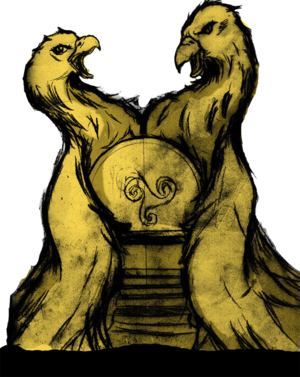
To foreigners it's sometimes hard to understand, but those who ascend the Throne will be referred to as Emperor. However, those blessed with being the reincarnation of one of the Prophets - or Sisera Herself - will hold the right to claim the title of Heavenly Light. The laws of the Empire provide no difference in privileges for both titles, but the influence the Heavenly Light has on public affairs is far more strong than of a simple Emperor. The tradition in Jingdao prescribes that the Heavenly Light can easily ignore the laws and constitutions of His or Her ancestors and can even single-handedly change ancient rites. A simple Emperor also holds this power, but requires approval of priests to avoid angering the Heaven.
The story about the mythological birth of the Jingdaoese people talks about how they followed Sisera and Her descendants. With this, the role of the House of Erasmii is already strongly intertwined with the nation's own existence. Later, with the creation of the First Empire and the ascension of the Prophet Mordechai (who was posthumously named Mengjiang Emperor) to the Throne, the Erasmii formally began their leadership over the Jingdaoese successor Realms.
On certain occasions the people were not led by a member of the Erasmii Clan. Both Herman Civilis (Grand-Duke of Southbatavia), Miguel Windsor (Magister of the Church) Rollin the Conqueror and the Provisional Government of 5984 - 5989 ASC took up the duties to govern the country and pave the way, not as Emperors, but as a sort of temporary stewards. Herman Civilis and Rollin received the honourary title Pavers of the Way and are recognised as important historical and religious figures. The role of Yuan Windsor, who made an attempt to kidnap the Kaiming Emperor and rule the nation in his stead, is more dubious: he's seen as one who has heavily influenced both the young Emperor once He returned, as the nation's policies (as an internal weakness of disloyalty was proven, which convinced the government that there were still impure elements within its own people which had to be destroyed).
Emperors who ascend the Throne must undergo a trial of combat to proof their worth. Since the Third Empire, the Emperors descend into a labyrinth beneath the Catodral of Apollo City, where mythical creatures lurk in the darkness. If the Emperor survives the proof and can return above the ground, He will truly hold the power which goes with His office.
Male Emperors are called with 'Ben Erasmus', while female rulers get the family name 'Bat Erasmus'. For example: Simon Ben Erasmus and Sisera Bat Erasmus. With their inauguration they also receive an Imperial name. For example, Heinrich Ben Erasmus became known as the Kattei Emperor (meaning 'Reborn').
Imperial Household
Responsible for the Imperial Family, its palaces and the personal guards. Falls under the Ministry but can not be controlled by the Minister and acts independent from it.
The Head Steward, in most cases a man who has surpassed the age of sixty, is in charge of the Household. Traditionally, he's chosen among the bound servants who have served in the Imperial Administration or served at the Heavenly Palace. He's not only responsible for the day-to-day affairs, the welcoming of important diplomats, but also in organising the Private Council.
Grand Secretariat
Diwang of the Empire
- See also: Diwang
The Diwang, also called Chancellor of the Empire (or Dachen) is the head of the Grand Secretariat. While the Imperial Assembly approves the government formation after each election, the Chancellor fully depends on the goodwill of the Emperor. As highest representative of the government (with exception of the Emperor) there is little room for mistakes. Several Chancellors have seen themselves being fired over relative small mistakes, as they need to be a shining example for the population.
The title itself goes back to the First Empire, and was changed many times. During the First and Second Era the title had a bad ring to it, thanks to the traitorous acts of Yuan Windsor, who abused his position to gain power and plot against the Throne. During the Third Era, the title became common use once more.
Ministry of Truth
The Ministry of Truth, often handled by the Chancellor himself, holds one of the more important Secretariats, responsible for the cultural and educational development of the people.
- Secretariat of Rites: Responsible for ceremonies and the protection of the national culture.
- Secretariat of Propaganda: Responsible for controlling the media and bring the Truth to the People.
- Secretariat of Education: Responsible for educating the masses.
- Secretariat of Censor: Responsible for censorship and re-education of delinquents.
Ministry of Purity
The Ministry of Purity pursues the financial aspects of the state, together with the appointments. It also closely checks which individuals from the outside world enter the Empire.
- Secretariat of Revenue: Financial and economical affairs.
- Secretariat of Immigration: Responsible for immigration and visa.
- Secretariat of Appointments: Responsible for the appointment of military and civil personnel.
Ministry of World Peace
The Ministry of World Peace has as goal to handle foreign affairs, seeks to coordinate and strengthen the Armed Forces of the Empire and its States. While handling justice, the Secretariat of Hanging, is not responsible for the Tegong, as that office acts independent from the Grand Secretariat.
- Secretariat of Slaying: Handles the armed forces.
- Secretariat of Sinking: Responsible for the coordination of the State Fleets.
- Secretariat of Hanging: Brings swift justice.
- Secretariat of Talking: Handles foreign affairs.
Jingbuist Soviet
Imperial Assembly
- See also: Imperial Assembly

The Imperial Assembly is the elective and legislative chamber of the Jingdaoese Empire. Elections are held around every 15 daor (3 months).
The Assembly came into power with the ascension of the Zettai Emperor to the Throne in 5989 ASC. Original plans to establish it as a strong, independent legislative institution with more or the same amount of power as the Emperor were soon thwarted, after heavy protests of ultranationalists. This kind of limited constitutional democracy (for Jingdaoese standards still enormous) led to it being called the Minshu Period.
The March Elections of 2016 even saw a landslide victory for the National-Centrist Party of the Rising Sun, with an election program which would further strengthen imperial power.
The two national main parties are the National-Centrist Party of the Rising Sun and United Jingdaoese Populist Party, both party follow a very nationalist program, but while the Populists support a liberal approach, the National-Centrists endorse strong interference of the government.
Seanad
The Seanad is a council of nobles. The nobles are appointed by the Emperor and represent their State. The Seanad almost never meets as its powers are limited to acting as supreme court and to amend the Constitution (for which 75% approval is needed).
The institution is most likely the oldest still functioning organisation on the Apollonian continent. It originally had its roots in the Republic of Blackrock during the first century (ASC), where it acted as the parliament of the military republic. Much later, in 3260 ASC, it was revived as the Ducal legislative and advisory council.
It's powers changed from era to era and strongly depended on the goodwill of the ruling Kildarian Dukes and nobility (of whom many considered the Seanad as a potential threat to their power in their counties). The coup d'état by Teodosius Myksos in 5149 ASC meant a temporary disbandment of the Seanad. The military losses against the barbarian invaders had made many citizens in Apollo City frustrated and angry towards the organisation which was perceived to rule over the country. It was reopened in 5267 ASC as a rubber stamp institution during the reign of Dutchess Sophia, and later on received more power under the reign of Dutch Flavius.
The Revolution of 5552 rendered the Seanad once again powerless, and was eventually reformed by the Caudillo Trajan Myksos, who forged it into a council of military governors. The glorious integration of the Apollonian Republic into Jingdao meant that the Seanad became a prestigious - but once more relatively powerless - rubber stamp institution and supreme court.
Private Council
Without doubt the true power within the Empire. While holding no official power, it is composed of the most important and influential people from the Realm. From the shadows it governs the nation with an iron fist and influences the Grand Secretariat in its decision making.
Titles of documents in the Council are viewable for the public, and for that reason are often made misleading.
Grandsire
The title of Grandsire was once used by the prime minister of the Princes of Aryasht. During the era of the Apollonian Republic it was the title of the president of the Provincial Assembly. Afterwards it was adopted by the Jingdaoese as a title granted by the Emperor as one of the highest honours that a person could receive. The person owning this title acted as vice-president during meetings of the Clans in case of the the Heavenly Light's absence.
Nowadays the title is still sometimes used to refer to the president of the Imperial Assembly, but this practice has more or less fallen in disarray.
Administrative Subdivisions
The States are the most important part of the Jingdaoese Empire. Each State is represented in the Imperial Assembly and - based on population numbers which were calculated 5989 ASC - receive a certain number of seats. Each 90 ASC years a federal election is held for the Assembly. Some States (mostly the rural and ultranationalist ones) receive a bigger advantage thanks to the electoral system. Especially the Imperial Cities receive a certain disadvantage, compared to the countryside.
Most States are divided into smaller subdivisions, like a Province (Norfolk uses the word 'Command'), to administer the lands. In many cases, the province borders are based on the old borders of former Counties, Baronies or Apollonian provinces.
Imperial Cities are important strategical cities with surrounding land which are governed and belong to a State but have received a certain degree of autonomy. They are separated from any Provinces, and receive their own seats (the minimum is one) in the Imperial Assembly.
The Empire has eight States, four Imperial Cities (of which one, Tyrenia, isn't part of any State) and fifty-six Provinces (not counting overseas territories).
- Kingdom of Naród Seaski (Saksenland)
- City of Epoli
- City of Apollo City
- Antya
- Apollantis
- Overantya
- Empty Steppes
- Tribes of Rish-En
- Kingdom of Batavia
- Dietsland
- Samarne
- Menen
- Alten
- Beijerstreek
- Caesteren
- Ingelheim
- Transingel
- Zilte
- Hemen
- Mayen
- Gotha
- Colonial Overseas Territories: Tyrasian Territories
- Kingdom of Vervollkomnung (Central Kildare)
- Automatica
- Blackrock
- Vervollkomnung
- Shexing
- Schlangen
- Gaofen
- Attera
- Halluci Nua
- Gong Federation
- Erlgau Isles
- North Gong Li
- South Gong Li
- Asherland
- Melangia
- Six Isles & Dong Hau
- Thanedom of Dalmacija
- City of Curagh
- Old Hallucination
- Kitanus Fields
- North Dalmacija
- South Dalmacija
- River Warrior's Tribe
- Carol Island
- Breiza Isles
- Republic of Norfolk
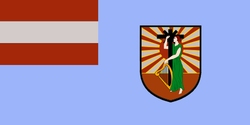 Flag of the Imperial Overseas Command, with the Jingdaoese flag and the goddess Germania.
Flag of the Imperial Overseas Command, with the Jingdaoese flag and the goddess Germania.- Calico Command
- Tymaria Command
- Jersey Command
- Camden Command
- Battlestation Command
- Norfolk Command
- Libertopia
- Biotopia
- Choconya
- Korantina
- Princedom of Eblis-Rulak
- Eblis
- Rulak
- Montauk
- Dyre Isles
- Duchy of Greater Bosania
- Valais
- Bosania
- Uri
- Vaud
- Grisons
- City State of Tyrenia
The overseas (non-Apollonian) territories are, since 6136 ASC, no longer part of the States of Batavia and Gong, but merged into forming the Imperial Overseas Command (which is administered by the Imperial Jingdaoese Navy).
Foreign Relations and Military
Foreign policy
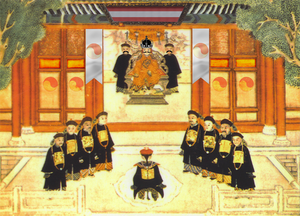
The foreign contacts between Jingdao and other nations has, in most cases, never been a fruitful and peaceful one. Since its establishment, the Jingdaoese people have seen themselves blessed (or cursed, according to some heretics) with the divine duty to unite Micras under their Heavenly Banner and spread the enlightenment of the Catologian Faith to all corners of the world. This brought the First Empire (located on Cibola) in a direct conflict with the Alexandrians (which were called Purple Horde) when they decided to close the Strait of Barbary for any foreign shipment if no heavy tax was paid.
Later on, during the Second Empire, the Jingdaoese were actively involved in aiding the Myksos Dynasty in Kildare. With the help of the Tegong the feudal Kildarian society transformed into a more centralist (but still very backward) state. The Mango Throne saw begrudgingly how their eastern Duchy became more and more dependant on the Jingdaoese and took several countermeasures, which in most cases failed. When Kildare wanted to join a military pact, the League of Nations for the Advancement of Purity, the Shirerithian government interfered and won the case in court. Some Tegong officers were deported, but the organisation kept active in secret.
During the Revolution of 5552 there was no official support from Jingdao for the independence of Kildare (which would become the Apollonian Republic of Shireroth's East) , but it was blamed to have had a hand in it. When the Republic was annexed into the Third Empire in 5719 ASC by the Haigui Emperor those rumours were stronger than ever.
The diplomatic history of Jingdao has therefore always been one of indirect conflict and a certain distrust towards (and from) the great powers of Micras. It shaped the policy of self-reliance and dominance. Since their annexation of Kildare into the Empire they follow an Apollonian Doctrine, with the main goal to keep the imperialist (read: foreign) influences) as limited as possible on the Apollonian continent.
As it was written down by a diplomat:
"Jingdao is a nation with people who have travelled throughout the world. They are not bound to the lands they were born on and will follow their Heavenly Light when this is desired from them. Nonetheless, we aren't a people who want to be bullied by the big boys. Alexandria blamed us for their own greed, Stormark blamed us for their own decadence, Shireroth blamed us for their own division and corruption. We merely show them the ugly truth, and therefore we are despised. Apollonia must therefore be a beacon of hope, and not the plaything of those imperialists. Stable nations on Micras, befriended with the Jingdaoese Realm: that's what we seek."—Xa Tang, 'Letter from a diplomat in Gerenia', 6105 ASC
The Apollonia Doctrine led to the establishment of a military pact, the Blackrock Pact, in 6118 ASC. Gerenia, the Brettish Isles, Calbion and Jingdao formed, together, a military organisation to support each other in the wars to come.
The Jingdaoese use the words 'Xing' and 'Hun' in the diplomatic theatre: Xing are nations pure enough to cooperate with, while Hun nations are seen as barbarian and potential enemies.
Traditionally, diplomatic contacts were made by paying tribute to the Heavenly Light. This popular custom, mainly in use during the First Empire, is still practised occasionally, but to a lesser extent.
Civil Service
Young Jingdaoese children are teached to love and protect their home from the very beginning. Becoming a good citizen means serving the country and its military with any means possible. To prepare them for a potentially harsh life they are strongly advised and pressured into joining the Young Wandering Society, a youth association. Not only war games, but also survival games and reconstruction is thought to them from a young age.
Those who, according to the supervisors, have the capability to become fine officers are sent to the military academies across the country to become Imperial Kadetten.
Jingdaoese are obligated to serve in the army, but thanks to the large number of volunteers, those obligations are never truly enforced.
| Name | Direct allegiance | Soldiers |
|---|---|---|
| National Protection Army | Dant of the NPA | 1,450,000 |
| National Defence Forces | Dant of the NDF | 4,250,000 |
| Young Wandering Society | Ministry of World Peace | 26,850,000 |
| Magical Knights | Ministry of World Peace | 300 |
| Kaiser Gaelen IV's Apollonian Guard | Imperial Household | 5,000 |
| Tegong | Imperial Household | 100,000 |
Military Branches
The military of the Empire could be divided in two more or less independent main branches: the land and naval forces. While the supreme commander of those forces is the Heavenly Light (for the land forces He holds the title of Caudillo, a remnant from merging the Jingdaoese troops with the old Apollonian Army), real command lies in the hands of Generals (also called Dants in the land forces) and the Ministry of World Peace.
Since 5984 ASC the States received the liberty to built and expand their own military force. Immediately, a naval expansion began between the States, as global threat was mainly coming from oversea empires.
The main branches are divided in several minor branches:
- Imperial Jingdaoese Navy
- Maritime Apollonian Customs Service: responsible for protecting the coast line.
- Imperial War Fleet: an expeditionary submarine fleet. The Imperial War Fleet has the Ocean Palace as its home port.
- State Navies
- Imperial Armed Forces
- National Protection Army: the well-equipped and trained soldiers of the Armed Forces. Often referred to as the Legions.
- Myxosean Guard: Former bodyguard of the leaders of Kildare (and later the Apollonian Republic), nowadays specialised for shock attacks.
- National Defence Forces: the reservists.
- Magical Knights: elite guards, using spiritual energy to help in combat. Mainly ceremonial and for the moral of the troops. Traditionally used by the Magister of the Church as honour guard.
- National Protection Army: the well-equipped and trained soldiers of the Armed Forces. Often referred to as the Legions.
- Imperial Jingdaose Headquarters: forces under direct command of the Imperial Household.
- Kaiser Gaelen IV's Apollonian Guard
- Tegong: intelligence and obedience service
The limited influence of the Imperial Jingdaoese Air Force has made it subordinated to the other military services.
Culture
National Symbols
Music
Religion
Education

Education is an important part of Jingdaoese society and even mentioned as one of the Five Principles of Jingbuism. It is obligated to go to school from 5 till at least 16 year. No child is allowed to have private schooling, as it is viewed as anti-social and not patriotic (school activities are after all meant to strengthen the unity between the pupils).
The principal educational emphasis lies on the great importance of traditional national political values, catologian religion and morality. The education system promotes traditional Jingdaoese values in the hierarchical nature of human relations, with the State and its Government superior to the individual, and the Emperor superior to the State. The educational system is used for supporting the militarized state and preparing future soldiers.
The government publishes official text books for all levels of student, and reinforce that with cultural activities and seminars. Children who don't perform in those activities are frowned upon by both teachers and pupils. The pupils who, at the age of 14, show much promise are sent to special military Kadetten schools to be trained to become officer.
Apart from indoctrination in nationalism and religion, children and school students receive military drills (survival, first aid). These are taken further by the Young Wandering Society. College students are trained for home defence and regular military units. Young women are seen as equals of the guys. Both receive first aid training.
Sports
Industrial power
The economy of the Empire has been very diverse, thanks to its large size and extending from mountain ranges to valleys and from lakes to seas. The Antya Province has since the ancient days had a monopoly on the production and distribution of excellent wine (Antyan wine). The Kingdom of Vervollkomnung is responsible for most of its wood and other natural resources which can be found in its vast forests, while the Thanedom of Dalmacija is famous for its mines, both gold and iron are present in large quantities.
More recently, Norfolk and Batavia have started working together in expanding their heavy industry, with the main focus on the expansion of military material. The industrial partnership, thanks to companies like Heimat Industries, led to the creation of several industrial complexes in both States. The Norfolkian city Acadeimos became a major player in the chemical industry thanks to the state funded Chemical Research Facility [1].
Visitors to Jingdao will notice that local currencies can differ from State to State, or even from Province to Province. While there is only one national currency, the Kala, which was adopted by the government from the Apollonian-Kildarian administration instead of using the original Frank (a Southbatavian currency), it is not uncommon to see people trade - mostly in remote villages - with other means.
Trade contacts are limited, as only a few ports are opened to the outside world. The Maritime Apollonian Customs Service has the responsibility to protect the economy from an overdose of foreign products and acts as a watchdog. The City of Tyrenia, Port Nevermore and Apollo City are the three largest trade ports.
National policies from the Grand Secretariat tend to focus on the expansion of the war industry, rather than supporting the luxury goods sector.



